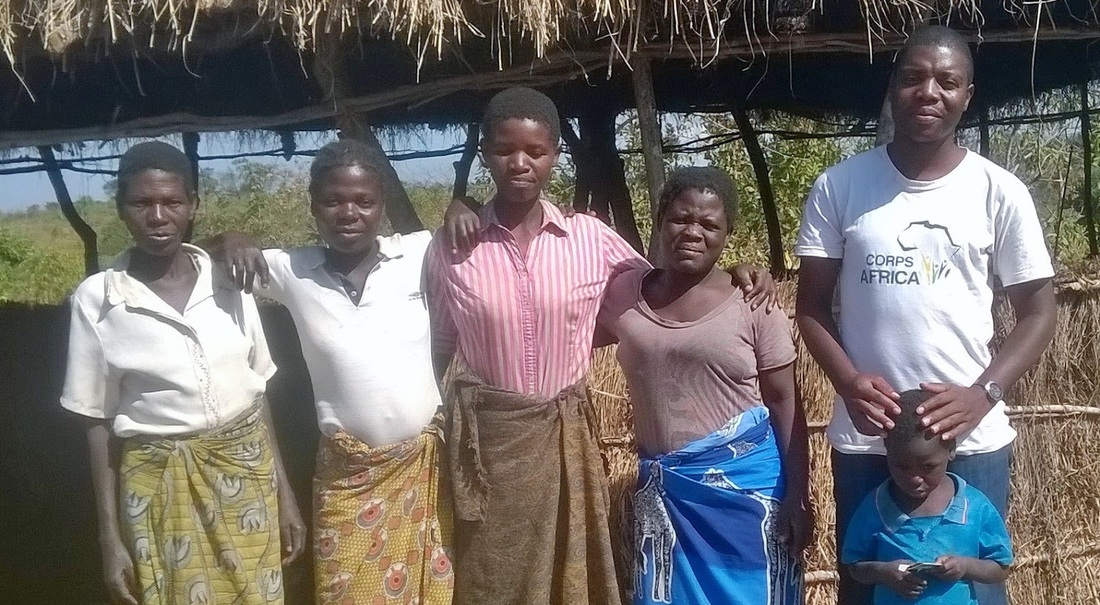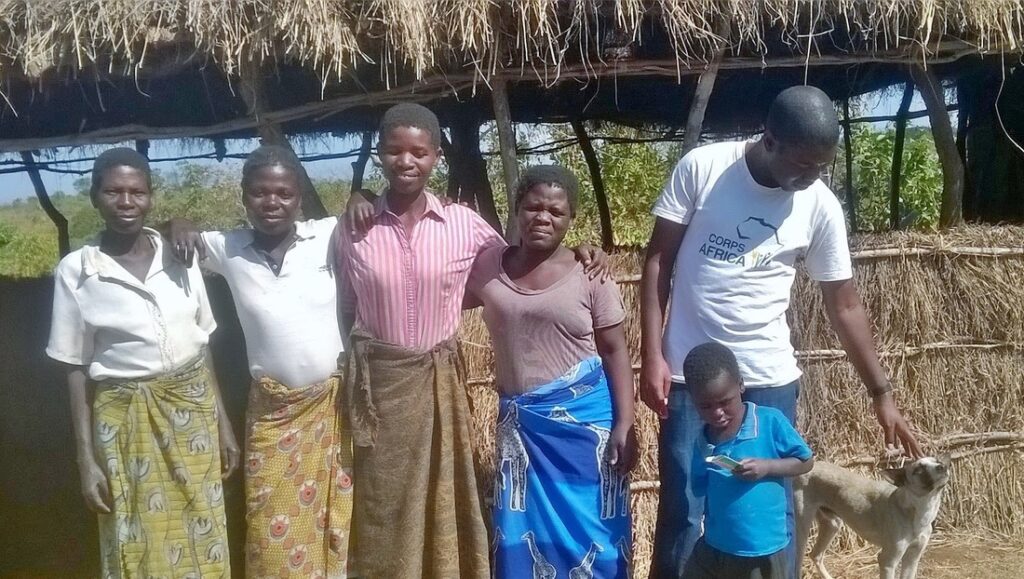Written by CorpsAfrica/Malawi Volunteer Mr. Emas Potolani
In my previous post, I shared more about women from my community, Chitete. And I tried to give some detailed account of the endeavors that these women are involved in here. Well, for those that run some small-scale businesses, Zalewa turn-off is a must-go destination so that they can capitalize on the many customers who invade the market on market days like today, Tuesday, and Saturday. Well, ever since I came here I have always been bothered by many thoughts, many thoughts on how I can help to transform the lives of the women here. Honestly, in as much as there are those women who are busy running up and down with various entrepreneurship activities, many women do not involve themselves in some activities that might in turn uplift them socioeconomically. I cited an example of the only woman who owns a small retail shop in the village and some who run various other activities like selling sugarcane and other local fruits. Not many of these women own and or run more sustainable businesses as compared to men of whom the greater percentage are running somewhat more sustainable businesses like motorcycle or bicycle taxi, retail shops and carpentry.
Well, in this post I would like to share with you about the IWETI (Integrated Women Empowerment Through Improved-Stove Production) project, that I am doing with a number of women in my community. The IWETI project is a project that I have just started following my deep thoughts about a practical way possible to help empower women without giving them handouts or anything near that. Well, it has been some rough road ever since I joined this community in February this year. I must appreciate the moral support I get from the CorpsAfrica family especially the Malawi team, they have helped me to take some precautions and consider a number of options before officially kicking off with projects involving women in my community. And the good thing is that I and my community have integrated amazingly over the past months as am their “alangizi a chitukuko” (Development facilitator), the name that most locals call me besides my other name, “sala” (a name the locals use to refer to a male teacher, borrowed from the English word Sir). I love my community really! it’s fun in its own way. I spent the month of May (2016) mobilizing women for the IWETI project. The mobilization was done through the community meetings which were attended by most community members here. Currently there are 10 women whom I am going to work with but the women suggested that we raise the membership number to 15.
Now, what does IWETI aim to achieve by the end of the day, and what is its relevance after all? Maybe you might be wondering the same. Alright, this project will involve teaching women and providing them with skills in the production of improved stoves as an income-generating activity, with the aim of contributing towards the social and economic empowerment of women and other disadvantaged groups in my community. The improved stoves will thus indeed compliment efforts by many other organizations in saving trees and towards saving the environment and in turn improve or achieve a better health for households in our community.
While other organizations are distributing similar stoves to communities, I believe the best way to empower women in my community is to train them, for herein lies true empowerment. After the women acquire this impeccable knowledge, they will be able to produce more Stoves as a group and later on take them to the market to sell. This will surely achieve social, environmental, and economic sustainability which are key pillars of rural community development. Socioeconomic empowerment is there because these women will be able to pocket some kwachas after selling these stoves at the market, and the environmental part is coming in because these stoves have been scientifically proved through research that they produce less smoke and most importantly that they use and require less firewood than the conventional method of cooking which uses 3 stones and a lot more firewood.
The IWETI Project is on the Prototype stage and today, the 28th of June, 2016 we started off with a formal training on how to produce the improved stoves. Although 4 out of the 10 women showed up for the training, I was so marveled to share my knowledge with them. Being a market day, most of the women couldn’t make it and so we’ve now decided to change our meeting days to Mondays every week. The training today focused on how to construct an Improved Stationed Stove and also on how to make or produce a Moveable Improved Stove. Our target for today was to be able to learn and get familiarized with the how to and also produce a prototype of the two Improved Stoves, but since the turn up was not as expected and that we didn’t manage to assemble the materials needed for the production, we decided to produce the prototype next Monday, July 4th 2016. The few women present were thrilled and excitedly volunteered for the prototypes of the stationed stoves to be done at their houses. Each of the group members will own the stationed stove in their kitchens courtesy of the group and this process will help the women to get familiar with the stove production process. I am so over the moon!
I will be sharing updates including pictures on the IWETI Project and I will very much appreciate your thoughts, feedback and possible partnership links to further help the women in my community. This project will need a good market for the produced stoves to make sure that the women make a good return out of the stoves. We will definitely need your hand.


